Evidence-Based Practice for Depression in Aged Care Settings
VerifiedAdded on 2022/10/11
|7
|2051
|13
Report
AI Summary
This report delves into evidence-based practice (EBP) for managing depression in aged care services. It emphasizes the importance of EBP in improving the quality of care for older adults, addressing the prevalence of depression and anxiety within this demographic. The report highlights non-pharmacological interventions, particularly cognitive behavioral therapy (CBT), as preferred methods for depression management, supported by research. It discusses the efficacy of CBT, including its application via phone for rural populations and its cost-effectiveness. The report also examines the experiences of older adults with CBT, their preferences, and the training required for nursing professionals to effectively deliver CBT. It outlines the CBT process, including goal setting, challenging maladaptive thoughts, and behavioral activation, concluding that effective management is crucial for improving care outcomes. References to relevant studies and figures are included to support the discussion, reinforcing the significance of non-pharmacological interventions in depression management within aged care.
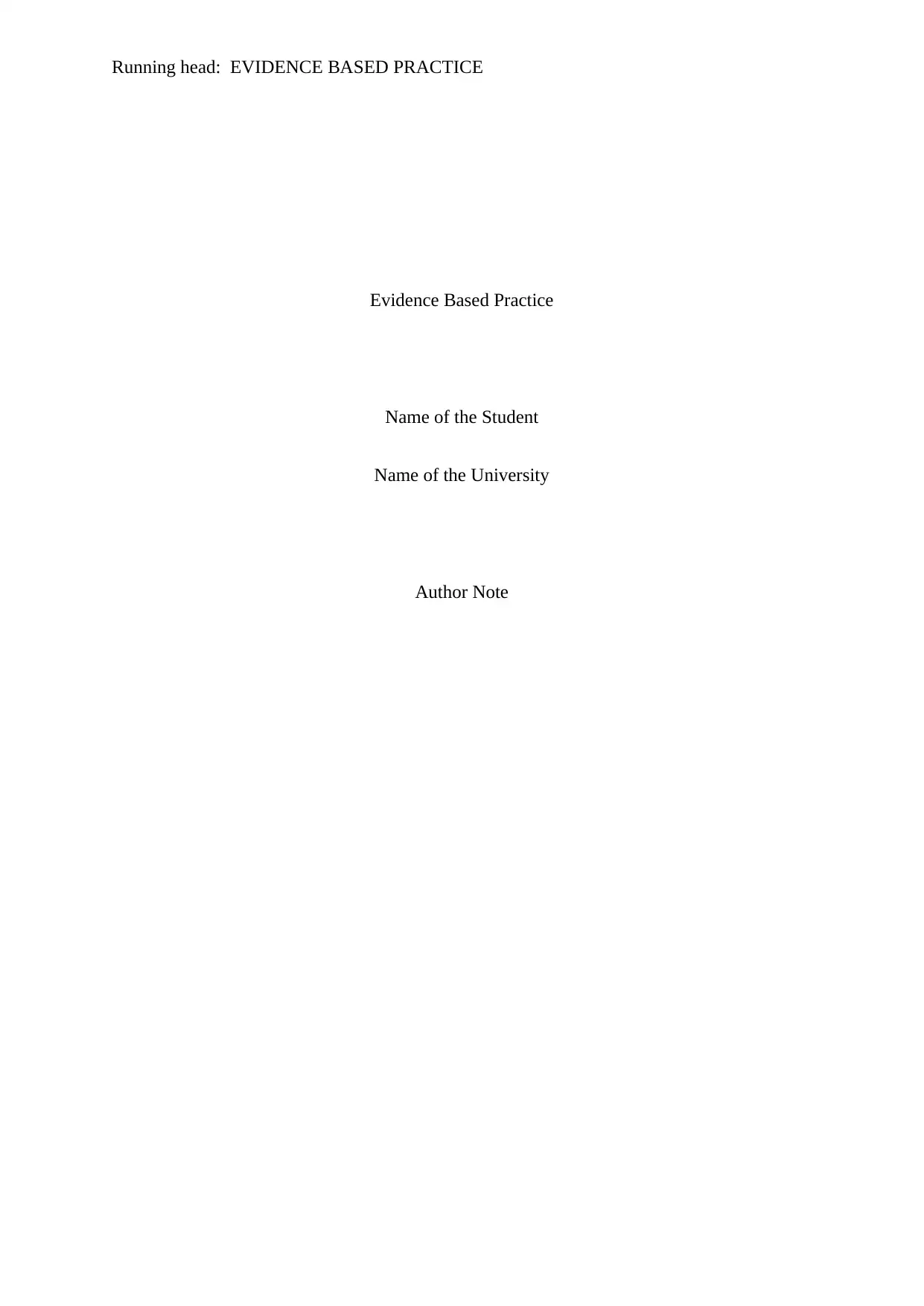
Running head: EVIDENCE BASED PRACTICE
Evidence Based Practice
Name of the Student
Name of the University
Author Note
Evidence Based Practice
Name of the Student
Name of the University
Author Note
Paraphrase This Document
Need a fresh take? Get an instant paraphrase of this document with our AI Paraphraser
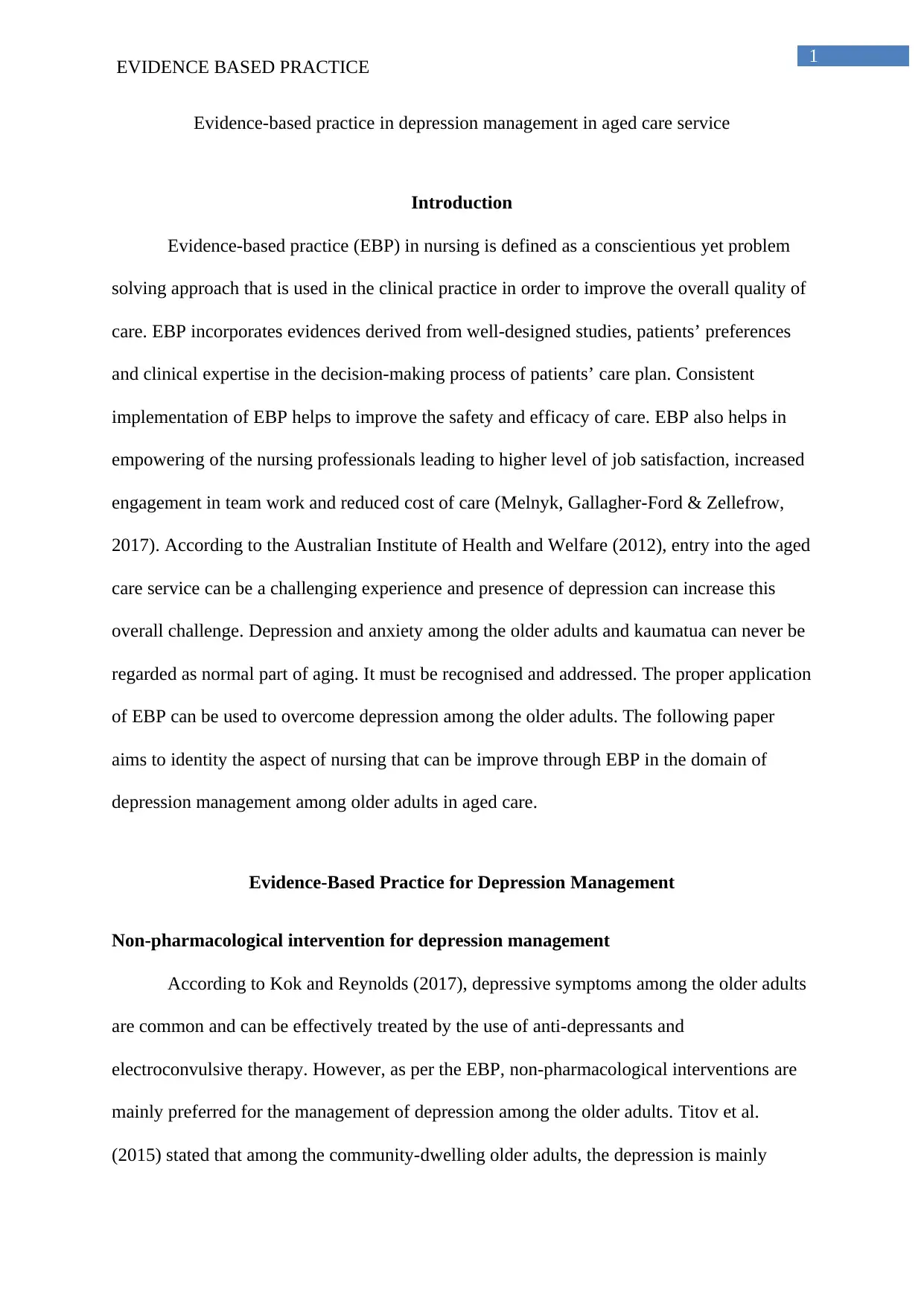
1
EVIDENCE BASED PRACTICE
Evidence-based practice in depression management in aged care service
Introduction
Evidence-based practice (EBP) in nursing is defined as a conscientious yet problem
solving approach that is used in the clinical practice in order to improve the overall quality of
care. EBP incorporates evidences derived from well-designed studies, patients’ preferences
and clinical expertise in the decision-making process of patients’ care plan. Consistent
implementation of EBP helps to improve the safety and efficacy of care. EBP also helps in
empowering of the nursing professionals leading to higher level of job satisfaction, increased
engagement in team work and reduced cost of care (Melnyk, Gallagher-Ford & Zellefrow,
2017). According to the Australian Institute of Health and Welfare (2012), entry into the aged
care service can be a challenging experience and presence of depression can increase this
overall challenge. Depression and anxiety among the older adults and kaumatua can never be
regarded as normal part of aging. It must be recognised and addressed. The proper application
of EBP can be used to overcome depression among the older adults. The following paper
aims to identity the aspect of nursing that can be improve through EBP in the domain of
depression management among older adults in aged care.
Evidence-Based Practice for Depression Management
Non-pharmacological intervention for depression management
According to Kok and Reynolds (2017), depressive symptoms among the older adults
are common and can be effectively treated by the use of anti-depressants and
electroconvulsive therapy. However, as per the EBP, non-pharmacological interventions are
mainly preferred for the management of depression among the older adults. Titov et al.
(2015) stated that among the community-dwelling older adults, the depression is mainly
EVIDENCE BASED PRACTICE
Evidence-based practice in depression management in aged care service
Introduction
Evidence-based practice (EBP) in nursing is defined as a conscientious yet problem
solving approach that is used in the clinical practice in order to improve the overall quality of
care. EBP incorporates evidences derived from well-designed studies, patients’ preferences
and clinical expertise in the decision-making process of patients’ care plan. Consistent
implementation of EBP helps to improve the safety and efficacy of care. EBP also helps in
empowering of the nursing professionals leading to higher level of job satisfaction, increased
engagement in team work and reduced cost of care (Melnyk, Gallagher-Ford & Zellefrow,
2017). According to the Australian Institute of Health and Welfare (2012), entry into the aged
care service can be a challenging experience and presence of depression can increase this
overall challenge. Depression and anxiety among the older adults and kaumatua can never be
regarded as normal part of aging. It must be recognised and addressed. The proper application
of EBP can be used to overcome depression among the older adults. The following paper
aims to identity the aspect of nursing that can be improve through EBP in the domain of
depression management among older adults in aged care.
Evidence-Based Practice for Depression Management
Non-pharmacological intervention for depression management
According to Kok and Reynolds (2017), depressive symptoms among the older adults
are common and can be effectively treated by the use of anti-depressants and
electroconvulsive therapy. However, as per the EBP, non-pharmacological interventions are
mainly preferred for the management of depression among the older adults. Titov et al.
(2015) stated that among the community-dwelling older adults, the depression is mainly

2
EVIDENCE BASED PRACTICE
attributed to bereavement, social isolation, physical alignment and inability to conduct the
activities of daily living. Kok and Reynolds (2017) are of the opinion that psychotherapy
alone or combined anti-depressant treatment is effective for the treatment of depression
among the older adults in the residential care or community dwelling older adults. Clinical
benefits arising from the psychotherapy is evident after 6 to 8 weeks.
Role of CBT in depression management
Titov et al. (2015) are of the opinion that manualized cognitive behavioural therapy
(CBT) is effective for the treatment of the depression among the older adults with comorbid
physical illness, cognitive impairment, and disability and comorbid anxiety. CBT challenges
the self-critical or pessimistic thoughts while emphasizing over rewarding activities and
reducing the behaviour that that increases the sense of depression. The study conducted by
Brenes et al. (2015) revealed proper application of the CBT is supported by EBP for the
treatment of anxiety in older adults. Decrease in the level of anxiety and stress helps in
overcoming the sense of depression among the older adults. CBT can be delivered through
phone. This approach is effective for the rural population. Nearly 10 to 11 sessions are
mandate for obtaining positive results through CBT in depression or anxiety management. In
order to track the normal dwelling of the older adults at least 2 to 4 months of follow-ups and
important and DSM-V is used as a parameter for the measuring the outcomes. The
randomized control trial undertaken by Dear et al. (2015) showed that CBT has potential for
older adults in order to reduce depression with significant clinical improvements. The overall
approach is also cost-effective. In of community dwelling urban population internet delivered
CBT is effective. For in-patient population, face-to-face CBT is used.
Experience of the older adults in CBT (200)
Kishitav and Laidlaw (2017) stated that use of the older adults tend to prefer CBT, a
non-pharmacological interventions in comparison to the use of the anti-depressant. The CBT
EVIDENCE BASED PRACTICE
attributed to bereavement, social isolation, physical alignment and inability to conduct the
activities of daily living. Kok and Reynolds (2017) are of the opinion that psychotherapy
alone or combined anti-depressant treatment is effective for the treatment of depression
among the older adults in the residential care or community dwelling older adults. Clinical
benefits arising from the psychotherapy is evident after 6 to 8 weeks.
Role of CBT in depression management
Titov et al. (2015) are of the opinion that manualized cognitive behavioural therapy
(CBT) is effective for the treatment of the depression among the older adults with comorbid
physical illness, cognitive impairment, and disability and comorbid anxiety. CBT challenges
the self-critical or pessimistic thoughts while emphasizing over rewarding activities and
reducing the behaviour that that increases the sense of depression. The study conducted by
Brenes et al. (2015) revealed proper application of the CBT is supported by EBP for the
treatment of anxiety in older adults. Decrease in the level of anxiety and stress helps in
overcoming the sense of depression among the older adults. CBT can be delivered through
phone. This approach is effective for the rural population. Nearly 10 to 11 sessions are
mandate for obtaining positive results through CBT in depression or anxiety management. In
order to track the normal dwelling of the older adults at least 2 to 4 months of follow-ups and
important and DSM-V is used as a parameter for the measuring the outcomes. The
randomized control trial undertaken by Dear et al. (2015) showed that CBT has potential for
older adults in order to reduce depression with significant clinical improvements. The overall
approach is also cost-effective. In of community dwelling urban population internet delivered
CBT is effective. For in-patient population, face-to-face CBT is used.
Experience of the older adults in CBT (200)
Kishitav and Laidlaw (2017) stated that use of the older adults tend to prefer CBT, a
non-pharmacological interventions in comparison to the use of the anti-depressant. The CBT
⊘ This is a preview!⊘
Do you want full access?
Subscribe today to unlock all pages.

Trusted by 1+ million students worldwide
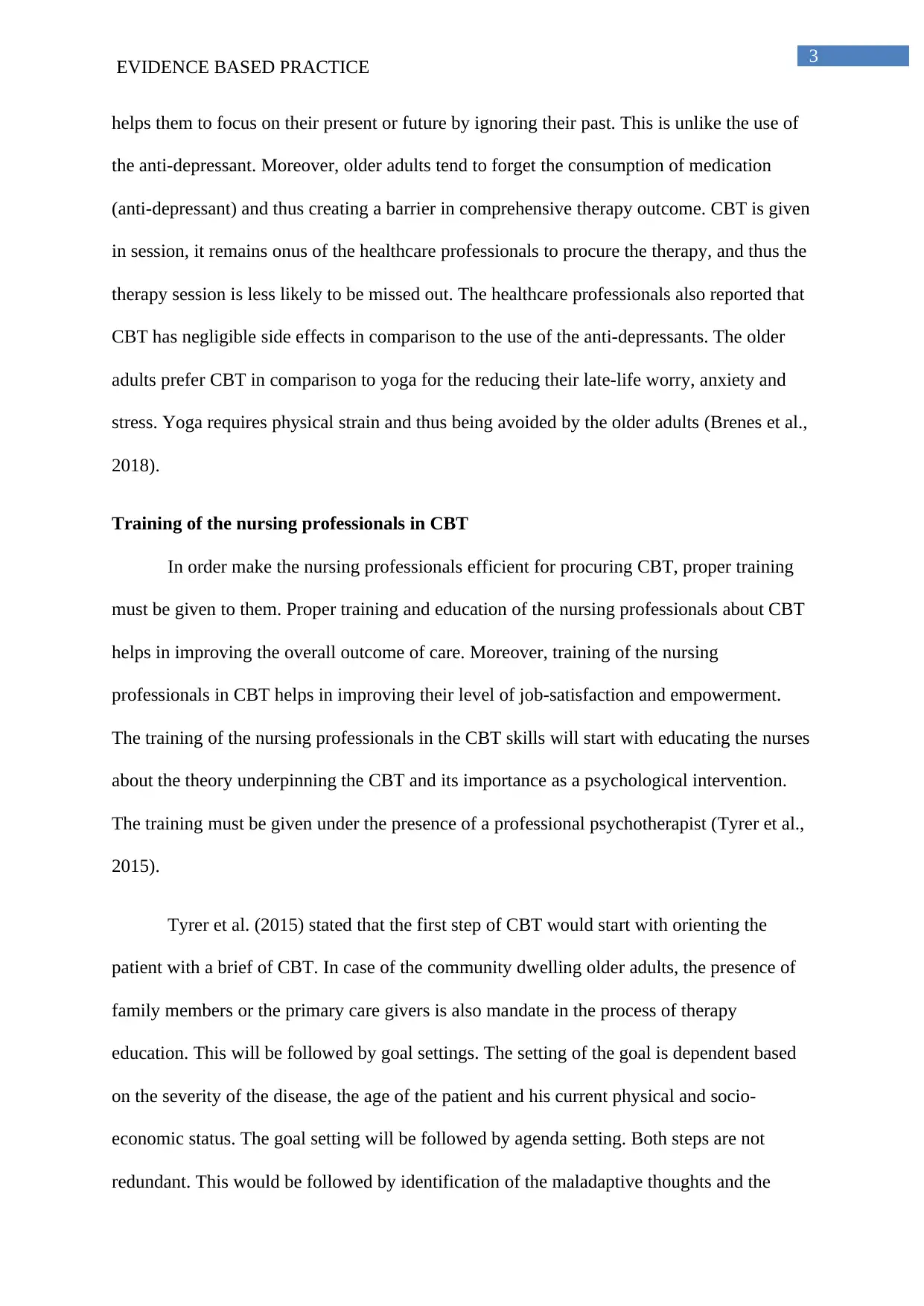
3
EVIDENCE BASED PRACTICE
helps them to focus on their present or future by ignoring their past. This is unlike the use of
the anti-depressant. Moreover, older adults tend to forget the consumption of medication
(anti-depressant) and thus creating a barrier in comprehensive therapy outcome. CBT is given
in session, it remains onus of the healthcare professionals to procure the therapy, and thus the
therapy session is less likely to be missed out. The healthcare professionals also reported that
CBT has negligible side effects in comparison to the use of the anti-depressants. The older
adults prefer CBT in comparison to yoga for the reducing their late-life worry, anxiety and
stress. Yoga requires physical strain and thus being avoided by the older adults (Brenes et al.,
2018).
Training of the nursing professionals in CBT
In order make the nursing professionals efficient for procuring CBT, proper training
must be given to them. Proper training and education of the nursing professionals about CBT
helps in improving the overall outcome of care. Moreover, training of the nursing
professionals in CBT helps in improving their level of job-satisfaction and empowerment.
The training of the nursing professionals in the CBT skills will start with educating the nurses
about the theory underpinning the CBT and its importance as a psychological intervention.
The training must be given under the presence of a professional psychotherapist (Tyrer et al.,
2015).
Tyrer et al. (2015) stated that the first step of CBT would start with orienting the
patient with a brief of CBT. In case of the community dwelling older adults, the presence of
family members or the primary care givers is also mandate in the process of therapy
education. This will be followed by goal settings. The setting of the goal is dependent based
on the severity of the disease, the age of the patient and his current physical and socio-
economic status. The goal setting will be followed by agenda setting. Both steps are not
redundant. This would be followed by identification of the maladaptive thoughts and the
EVIDENCE BASED PRACTICE
helps them to focus on their present or future by ignoring their past. This is unlike the use of
the anti-depressant. Moreover, older adults tend to forget the consumption of medication
(anti-depressant) and thus creating a barrier in comprehensive therapy outcome. CBT is given
in session, it remains onus of the healthcare professionals to procure the therapy, and thus the
therapy session is less likely to be missed out. The healthcare professionals also reported that
CBT has negligible side effects in comparison to the use of the anti-depressants. The older
adults prefer CBT in comparison to yoga for the reducing their late-life worry, anxiety and
stress. Yoga requires physical strain and thus being avoided by the older adults (Brenes et al.,
2018).
Training of the nursing professionals in CBT
In order make the nursing professionals efficient for procuring CBT, proper training
must be given to them. Proper training and education of the nursing professionals about CBT
helps in improving the overall outcome of care. Moreover, training of the nursing
professionals in CBT helps in improving their level of job-satisfaction and empowerment.
The training of the nursing professionals in the CBT skills will start with educating the nurses
about the theory underpinning the CBT and its importance as a psychological intervention.
The training must be given under the presence of a professional psychotherapist (Tyrer et al.,
2015).
Tyrer et al. (2015) stated that the first step of CBT would start with orienting the
patient with a brief of CBT. In case of the community dwelling older adults, the presence of
family members or the primary care givers is also mandate in the process of therapy
education. This will be followed by goal settings. The setting of the goal is dependent based
on the severity of the disease, the age of the patient and his current physical and socio-
economic status. The goal setting will be followed by agenda setting. Both steps are not
redundant. This would be followed by identification of the maladaptive thoughts and the
Paraphrase This Document
Need a fresh take? Get an instant paraphrase of this document with our AI Paraphraser
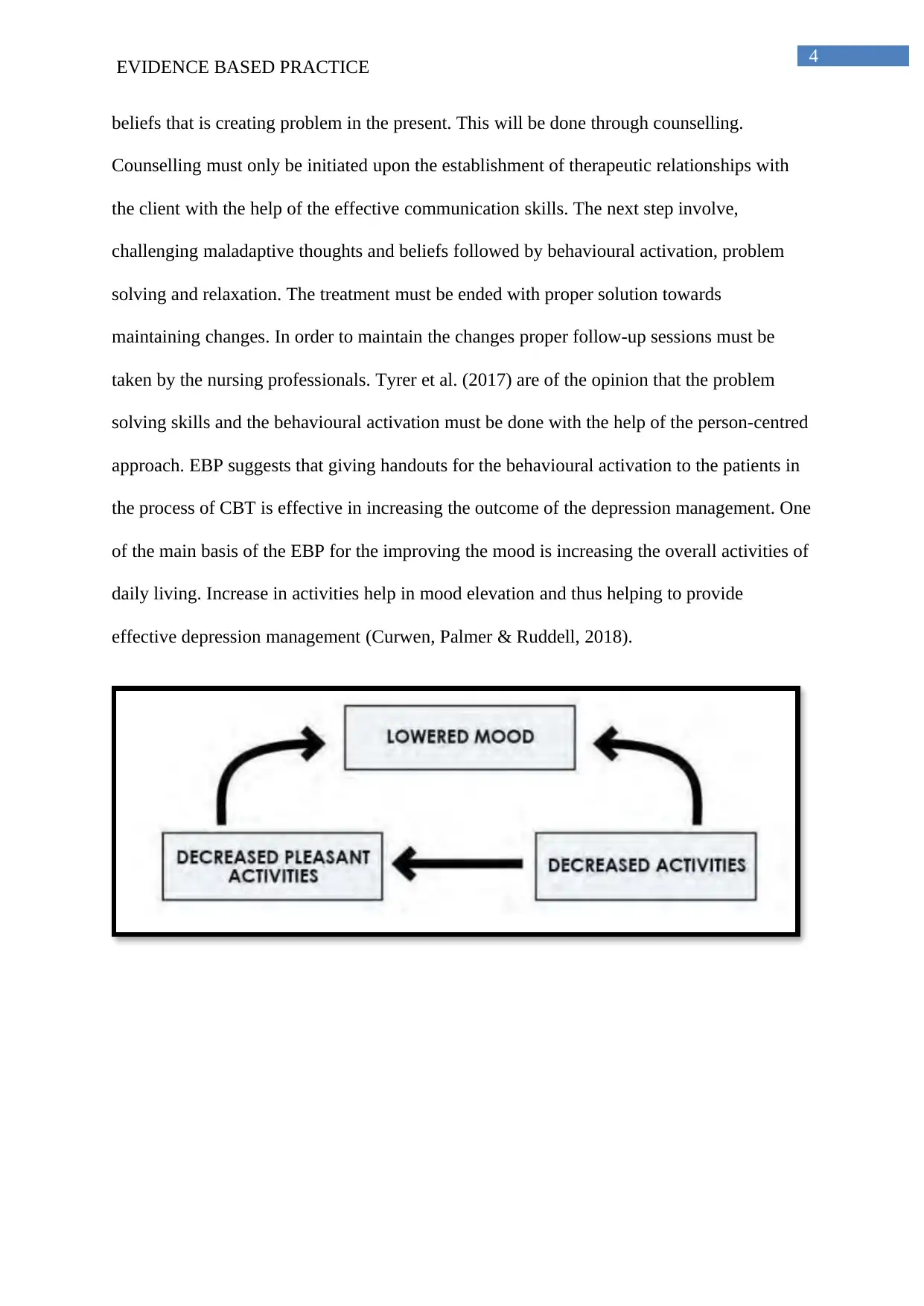
4
EVIDENCE BASED PRACTICE
beliefs that is creating problem in the present. This will be done through counselling.
Counselling must only be initiated upon the establishment of therapeutic relationships with
the client with the help of the effective communication skills. The next step involve,
challenging maladaptive thoughts and beliefs followed by behavioural activation, problem
solving and relaxation. The treatment must be ended with proper solution towards
maintaining changes. In order to maintain the changes proper follow-up sessions must be
taken by the nursing professionals. Tyrer et al. (2017) are of the opinion that the problem
solving skills and the behavioural activation must be done with the help of the person-centred
approach. EBP suggests that giving handouts for the behavioural activation to the patients in
the process of CBT is effective in increasing the outcome of the depression management. One
of the main basis of the EBP for the improving the mood is increasing the overall activities of
daily living. Increase in activities help in mood elevation and thus helping to provide
effective depression management (Curwen, Palmer & Ruddell, 2018).
EVIDENCE BASED PRACTICE
beliefs that is creating problem in the present. This will be done through counselling.
Counselling must only be initiated upon the establishment of therapeutic relationships with
the client with the help of the effective communication skills. The next step involve,
challenging maladaptive thoughts and beliefs followed by behavioural activation, problem
solving and relaxation. The treatment must be ended with proper solution towards
maintaining changes. In order to maintain the changes proper follow-up sessions must be
taken by the nursing professionals. Tyrer et al. (2017) are of the opinion that the problem
solving skills and the behavioural activation must be done with the help of the person-centred
approach. EBP suggests that giving handouts for the behavioural activation to the patients in
the process of CBT is effective in increasing the outcome of the depression management. One
of the main basis of the EBP for the improving the mood is increasing the overall activities of
daily living. Increase in activities help in mood elevation and thus helping to provide
effective depression management (Curwen, Palmer & Ruddell, 2018).
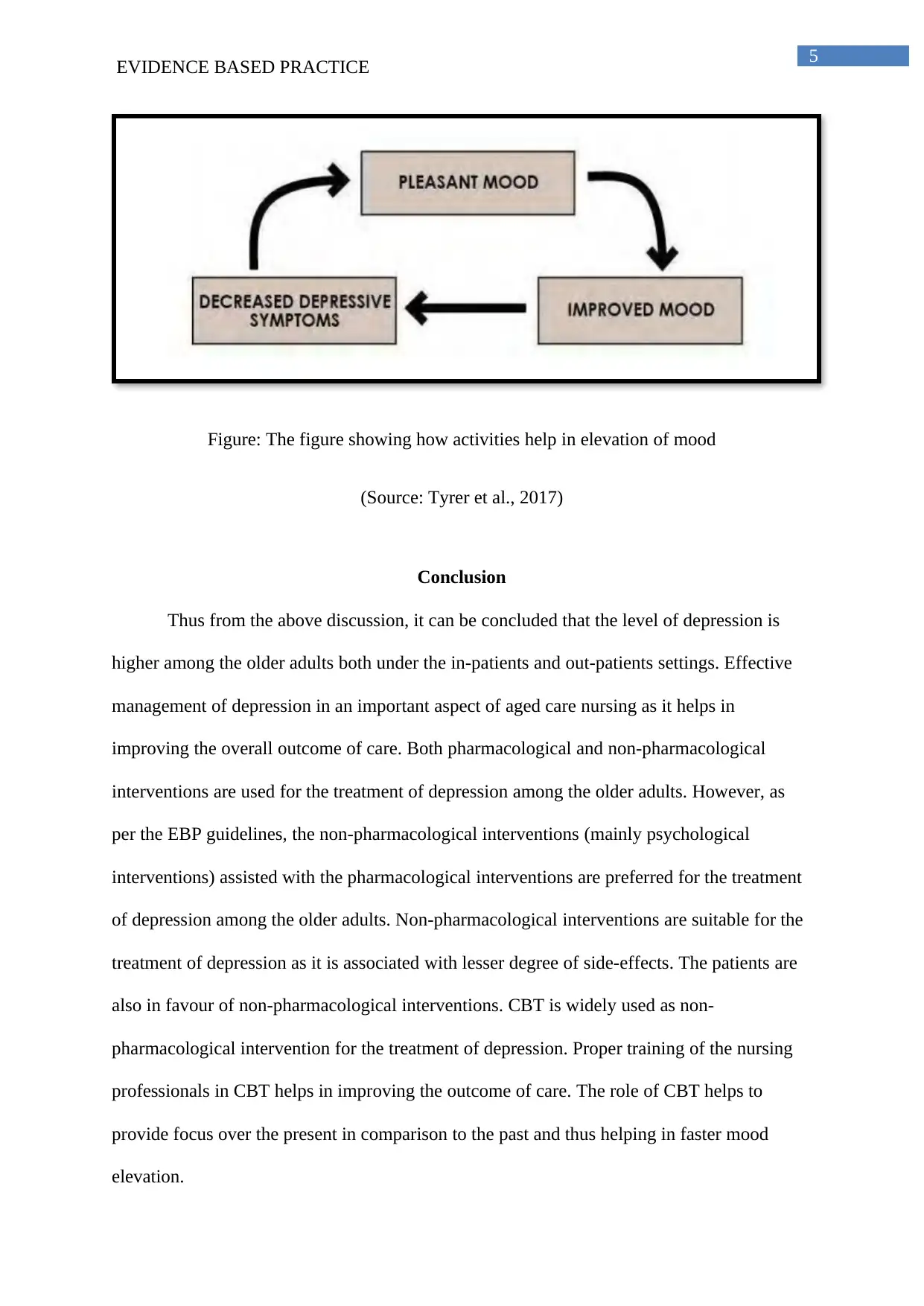
5
EVIDENCE BASED PRACTICE
Figure: The figure showing how activities help in elevation of mood
(Source: Tyrer et al., 2017)
Conclusion
Thus from the above discussion, it can be concluded that the level of depression is
higher among the older adults both under the in-patients and out-patients settings. Effective
management of depression in an important aspect of aged care nursing as it helps in
improving the overall outcome of care. Both pharmacological and non-pharmacological
interventions are used for the treatment of depression among the older adults. However, as
per the EBP guidelines, the non-pharmacological interventions (mainly psychological
interventions) assisted with the pharmacological interventions are preferred for the treatment
of depression among the older adults. Non-pharmacological interventions are suitable for the
treatment of depression as it is associated with lesser degree of side-effects. The patients are
also in favour of non-pharmacological interventions. CBT is widely used as non-
pharmacological intervention for the treatment of depression. Proper training of the nursing
professionals in CBT helps in improving the outcome of care. The role of CBT helps to
provide focus over the present in comparison to the past and thus helping in faster mood
elevation.
EVIDENCE BASED PRACTICE
Figure: The figure showing how activities help in elevation of mood
(Source: Tyrer et al., 2017)
Conclusion
Thus from the above discussion, it can be concluded that the level of depression is
higher among the older adults both under the in-patients and out-patients settings. Effective
management of depression in an important aspect of aged care nursing as it helps in
improving the overall outcome of care. Both pharmacological and non-pharmacological
interventions are used for the treatment of depression among the older adults. However, as
per the EBP guidelines, the non-pharmacological interventions (mainly psychological
interventions) assisted with the pharmacological interventions are preferred for the treatment
of depression among the older adults. Non-pharmacological interventions are suitable for the
treatment of depression as it is associated with lesser degree of side-effects. The patients are
also in favour of non-pharmacological interventions. CBT is widely used as non-
pharmacological intervention for the treatment of depression. Proper training of the nursing
professionals in CBT helps in improving the outcome of care. The role of CBT helps to
provide focus over the present in comparison to the past and thus helping in faster mood
elevation.
⊘ This is a preview!⊘
Do you want full access?
Subscribe today to unlock all pages.

Trusted by 1+ million students worldwide
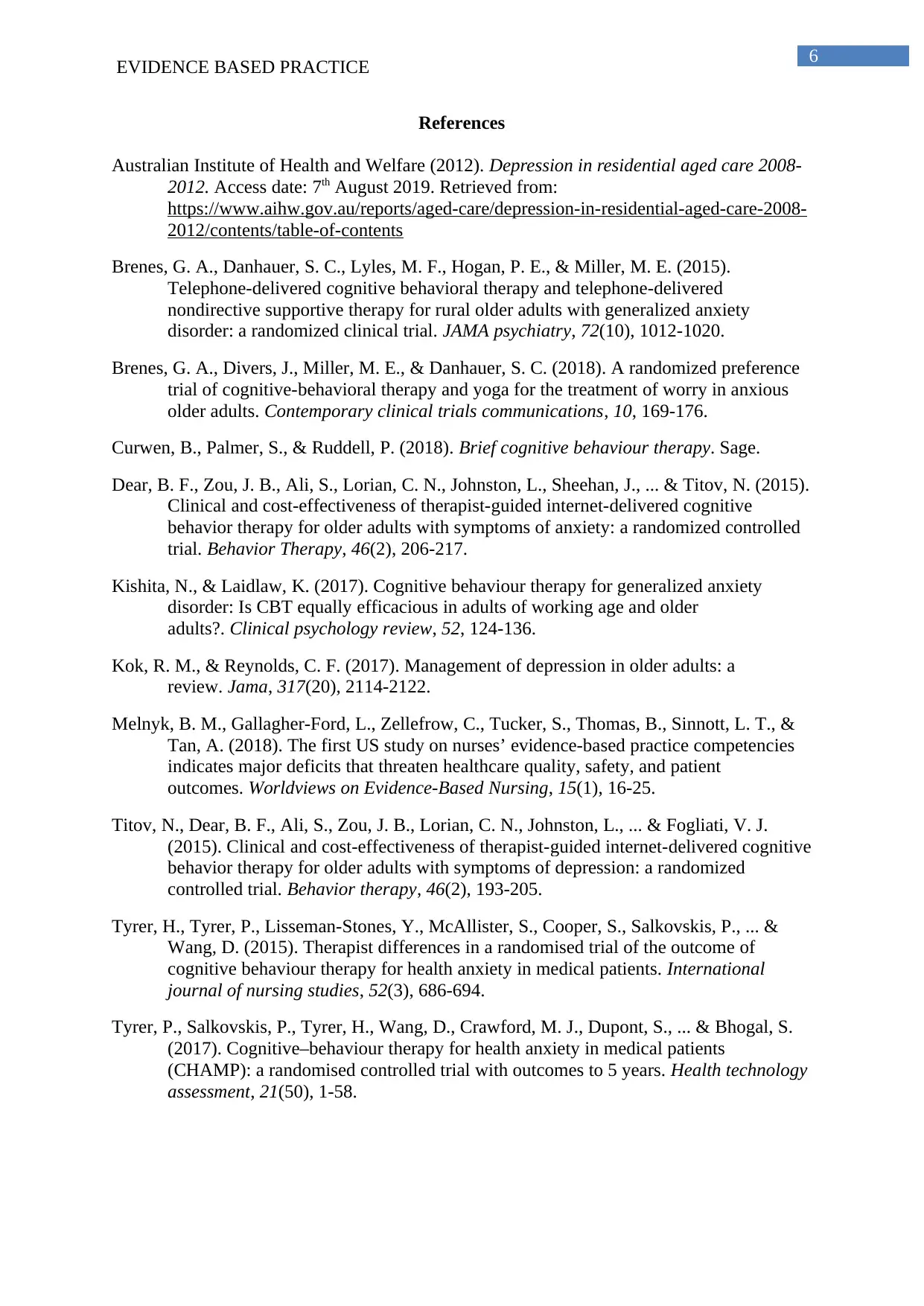
6
EVIDENCE BASED PRACTICE
References
Australian Institute of Health and Welfare (2012). Depression in residential aged care 2008-
2012. Access date: 7th August 2019. Retrieved from:
https://www.aihw.gov.au/reports/aged-care/depression-in-residential-aged-care-2008-
2012/contents/table-of-contents
Brenes, G. A., Danhauer, S. C., Lyles, M. F., Hogan, P. E., & Miller, M. E. (2015).
Telephone-delivered cognitive behavioral therapy and telephone-delivered
nondirective supportive therapy for rural older adults with generalized anxiety
disorder: a randomized clinical trial. JAMA psychiatry, 72(10), 1012-1020.
Brenes, G. A., Divers, J., Miller, M. E., & Danhauer, S. C. (2018). A randomized preference
trial of cognitive-behavioral therapy and yoga for the treatment of worry in anxious
older adults. Contemporary clinical trials communications, 10, 169-176.
Curwen, B., Palmer, S., & Ruddell, P. (2018). Brief cognitive behaviour therapy. Sage.
Dear, B. F., Zou, J. B., Ali, S., Lorian, C. N., Johnston, L., Sheehan, J., ... & Titov, N. (2015).
Clinical and cost-effectiveness of therapist-guided internet-delivered cognitive
behavior therapy for older adults with symptoms of anxiety: a randomized controlled
trial. Behavior Therapy, 46(2), 206-217.
Kishita, N., & Laidlaw, K. (2017). Cognitive behaviour therapy for generalized anxiety
disorder: Is CBT equally efficacious in adults of working age and older
adults?. Clinical psychology review, 52, 124-136.
Kok, R. M., & Reynolds, C. F. (2017). Management of depression in older adults: a
review. Jama, 317(20), 2114-2122.
Melnyk, B. M., Gallagher‐Ford, L., Zellefrow, C., Tucker, S., Thomas, B., Sinnott, L. T., &
Tan, A. (2018). The first US study on nurses’ evidence‐based practice competencies
indicates major deficits that threaten healthcare quality, safety, and patient
outcomes. Worldviews on Evidence‐Based Nursing, 15(1), 16-25.
Titov, N., Dear, B. F., Ali, S., Zou, J. B., Lorian, C. N., Johnston, L., ... & Fogliati, V. J.
(2015). Clinical and cost-effectiveness of therapist-guided internet-delivered cognitive
behavior therapy for older adults with symptoms of depression: a randomized
controlled trial. Behavior therapy, 46(2), 193-205.
Tyrer, H., Tyrer, P., Lisseman-Stones, Y., McAllister, S., Cooper, S., Salkovskis, P., ... &
Wang, D. (2015). Therapist differences in a randomised trial of the outcome of
cognitive behaviour therapy for health anxiety in medical patients. International
journal of nursing studies, 52(3), 686-694.
Tyrer, P., Salkovskis, P., Tyrer, H., Wang, D., Crawford, M. J., Dupont, S., ... & Bhogal, S.
(2017). Cognitive–behaviour therapy for health anxiety in medical patients
(CHAMP): a randomised controlled trial with outcomes to 5 years. Health technology
assessment, 21(50), 1-58.
EVIDENCE BASED PRACTICE
References
Australian Institute of Health and Welfare (2012). Depression in residential aged care 2008-
2012. Access date: 7th August 2019. Retrieved from:
https://www.aihw.gov.au/reports/aged-care/depression-in-residential-aged-care-2008-
2012/contents/table-of-contents
Brenes, G. A., Danhauer, S. C., Lyles, M. F., Hogan, P. E., & Miller, M. E. (2015).
Telephone-delivered cognitive behavioral therapy and telephone-delivered
nondirective supportive therapy for rural older adults with generalized anxiety
disorder: a randomized clinical trial. JAMA psychiatry, 72(10), 1012-1020.
Brenes, G. A., Divers, J., Miller, M. E., & Danhauer, S. C. (2018). A randomized preference
trial of cognitive-behavioral therapy and yoga for the treatment of worry in anxious
older adults. Contemporary clinical trials communications, 10, 169-176.
Curwen, B., Palmer, S., & Ruddell, P. (2018). Brief cognitive behaviour therapy. Sage.
Dear, B. F., Zou, J. B., Ali, S., Lorian, C. N., Johnston, L., Sheehan, J., ... & Titov, N. (2015).
Clinical and cost-effectiveness of therapist-guided internet-delivered cognitive
behavior therapy for older adults with symptoms of anxiety: a randomized controlled
trial. Behavior Therapy, 46(2), 206-217.
Kishita, N., & Laidlaw, K. (2017). Cognitive behaviour therapy for generalized anxiety
disorder: Is CBT equally efficacious in adults of working age and older
adults?. Clinical psychology review, 52, 124-136.
Kok, R. M., & Reynolds, C. F. (2017). Management of depression in older adults: a
review. Jama, 317(20), 2114-2122.
Melnyk, B. M., Gallagher‐Ford, L., Zellefrow, C., Tucker, S., Thomas, B., Sinnott, L. T., &
Tan, A. (2018). The first US study on nurses’ evidence‐based practice competencies
indicates major deficits that threaten healthcare quality, safety, and patient
outcomes. Worldviews on Evidence‐Based Nursing, 15(1), 16-25.
Titov, N., Dear, B. F., Ali, S., Zou, J. B., Lorian, C. N., Johnston, L., ... & Fogliati, V. J.
(2015). Clinical and cost-effectiveness of therapist-guided internet-delivered cognitive
behavior therapy for older adults with symptoms of depression: a randomized
controlled trial. Behavior therapy, 46(2), 193-205.
Tyrer, H., Tyrer, P., Lisseman-Stones, Y., McAllister, S., Cooper, S., Salkovskis, P., ... &
Wang, D. (2015). Therapist differences in a randomised trial of the outcome of
cognitive behaviour therapy for health anxiety in medical patients. International
journal of nursing studies, 52(3), 686-694.
Tyrer, P., Salkovskis, P., Tyrer, H., Wang, D., Crawford, M. J., Dupont, S., ... & Bhogal, S.
(2017). Cognitive–behaviour therapy for health anxiety in medical patients
(CHAMP): a randomised controlled trial with outcomes to 5 years. Health technology
assessment, 21(50), 1-58.
1 out of 7
Related Documents
Your All-in-One AI-Powered Toolkit for Academic Success.
+13062052269
info@desklib.com
Available 24*7 on WhatsApp / Email
![[object Object]](/_next/static/media/star-bottom.7253800d.svg)
Unlock your academic potential
Copyright © 2020–2026 A2Z Services. All Rights Reserved. Developed and managed by ZUCOL.





